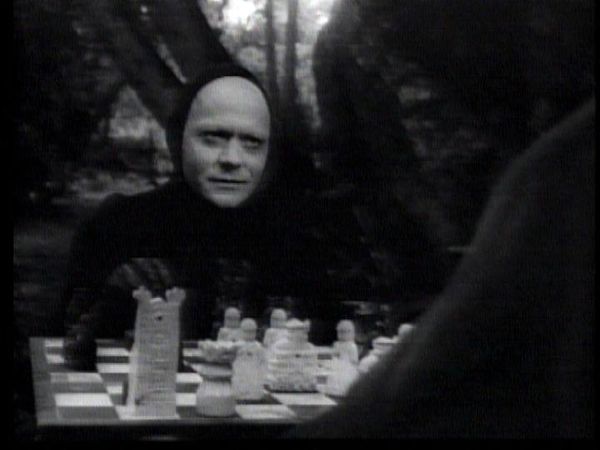It's interesting that a Swedish film could sink into the pop consciousness of America, but in the 1950's foreign films had a period where average Joes might see a foreign film (often on the off chance they might see a bare breast or two). But even into the 1990's, if Death was represented on screen, there was a chance it would be a riff on the white faced and black robed Death featured in The Seventh Seal. In Ingmar Bergman's world, Death is a very nasty Mime. My review after the jump.
The Seventh Seal is a transitional work for the master director. Following up his Smiles of a Summer Night (1955), the film suggested what many would come to expect from the director, and Swedish cinema in general. On some level, the film can be interpreted that way, but as Glenn Kenny noted, the film has a roguish sense of humor. It may also partly be a response to the romantic character of death portrayed in Jean Cocteau's Orpheus, where this death is more quixotic, a cheater, inevitable.
A Soldier washes up on shore named Antonius Block (Max Von Sydow), he meets death (Bengt Ekerot), who is there to take him, but in challenging him to a game of chess buys himself some time. He might be able to win, but Death is a sneaky fellow (Death gets to play black). He is accompanied by his Sancho Panza, Jons (Gunnar Bjornstrand) who wryly observes their fate. There's also a family on the road, the clown Jof (Mils Poppe) and his wife Mia (Bibi Andersson). As the game keeps going, the men stumble across a country in fear of the plague, which is fair enough as death is following them. Their party keeps getting bigger and bigger, leading to a greater reward for Death. But their game must be played to the end.
Less an example of fatalism as a meditation on the nature of life and death, The Seventh Seal is more black comedy at times, though there are weighty themes at the heart (like I said, it was more of a transition into what some expect of Bergman than the best example of his later bleakness). Woody Allen saw the comic possibilities of the imagery, but it is there to start with. But like most great films, there is much to glean from the film. Like any film that has stood the test of time, there is much to get out of the film, and it's well worth digging into.
The new Criterion Collection Blu-ray makes that easy. The film is presented in full frame (1.33:1) and in 1.0 Swedish Mono, and an English dub track. There's also a Peter Cowie commentary done for the original Criterion lasterdisc in 1987. The film comes with an introduction by the director (3 min.) done in 2003. More in depth is the feature length documentary on the director Bergman Island (84 min.), a long series of interviews with the director recounting his life and career. Never having seen much of the man in action, I was transfixed. It gives more attention to his most personal films, Scenes from a Marriage and Fanny Alexander get more screen-time than The Silence, for say. Peter Cowie gets to add an afterword (10 min.). Cowie also provides an interview with Max Von Sydow (20 min.) on the film and Sydow himself. Woody Allen gets his say (7 min.), who lauds the man and his gifts (for TCM). Bergman 101 (35 min.) walks you through the man's career for those unfamiliar with his works, while the disc also comes with the film's theatrical trailer.


.jpg)
.jpg)
